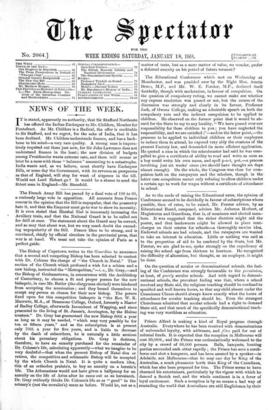The Educational Conference which met on Wednesday at Manchester, and
was presided over by the Right Hon. Austin Bruc3, M.P., and Mr. W. E. Forster, M.P., declared itself decidedly, though with moderation, in favour of compulsion. On the question of compulsory rating, we cannot make out whether any express resolution was passed or not, but the course of the discussion was strongly and clearly in its favour, Professor Jack, of Owens College, making an admirable speech on both the compulsory rate and the indirect compulsion to be applied to children. He observed on the former point that it would be ab- surd for the State to say to any locality, " We have passed over our responsibility for these children to you ; you have neglected the responsibility, and we are satisfied ;"—and on the latter point,—the pressure to be applied to individual children or their employers to induce them to attend, he exposed very ably the evasions of the present Factory law, and demanded its more efficient application. He quoted a case in which the schoolmaster had said he was com- pelled to give a certificate of ability to read and write as soon as. a boy could write his own name, and spell p-o-t, pot,—a process. involving just six weeks' cram (we should have thought six days almostenough). On the whole, the Congress was clear for com- pulsion both on the ratepayers and the scholars, though in the latter case compulsion meant only refusing to allow children under a certain age to work for wages without a certificate of attendance in school.






























